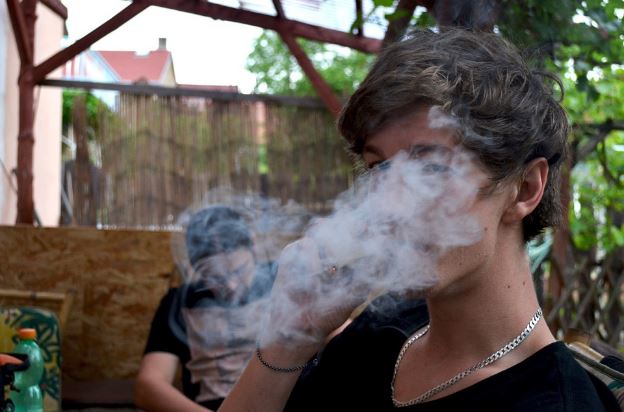
Being a parent is frightening enough - even before they learn to walk, if we’re being honest - and then they become teenagers and enter the big wide world of booze and drugs. Just the thought is enough to set most parents on edge.
The media tells us that our kids are more susceptible than ever to falling prey to drug and alcohol abuse, especially hard drugs like heroin and other opioids. But in truth when we look at the statistics, teens are far from the most affected population in the undeniably gruesome US opioid crisis. Parents, take a moment to breathe.

Courtesy of PBS
The Realities
Scare tactics aside, the world is still, well, what it is - and it is likely that teens will encounter drugs or alcohol somewhere along the way. Marijuana, ecstasy, and prescription drugs are among the most commonly abused by adolescents, and parents would be remiss to pretend like they don’t exist as realities for teens. The most important thing we can do for our kids is to pay attention to their lives as much as possible. If they are displaying signs that could point to substance abuse issues - extreme moodiness, isolation, declining grades, changing friend groups - talk to them, and address your concerns head-on. Seeing warning signs can allow a parent to act from a place of prevention, to redefine the problem, before it gets unmanageable.
In nearly every act of parenthood, parents walk a fine line between compassion and discipline. Does it really work to throw a kid out of the house if they’re using drugs? Where is the line between enabling a would-be addict and tossing them to the wolves to fight the battle all alone?
Some experts have voiced concern about the “tough love” approach to parenting when an adolescent is toying with drugs and alcohol. They say there is something intrinsically counterproductive about shaming our kids and cutting them off at the first signs of potential of drug use.
Perhaps it time to reframe the problem, and our response to it.
It would seem that the era of substance exposure prevention has come to an end. There’s no way that parents can shelter teens from all the drugs and alcohol in the world, and studies show that the general alternative has been to err on the side of ignorance. So what is left to do? Sit by and wait for kids to start experimenting with drugs before saying anything? Hardly.
Harm Reduction
Many recovery specialists are seeing the value of treating teen addicts with a more holistic approach, and using the benefit of parental intervention to their advantage. Parents, who are sometimes the first adults to suspect their child’s drug use, are asked to fortify their children with the skills to resist addiction before it even becomes a problem.
Addiction specialist Stanton Peele calls this the resilience model:
The resilience model means that you have helped a child to become sufficiently sturdy so that he or she won’t be waylaid by every potential addiction they encounter in life.
This is, after all, quite a different way of thinking about addiction and prevention, isn’t it? Instead of “Drugs are evil and uncontrollable, so just say no,” we are saying, “We have instilled in you sufficient confidence, self-respect, values, and – above all – purpose in your life so that we believe you will be able to resist addiction when you experience these things and activities.”
It sounds like a great alternative, no? It doesn’t end there. What about parents who have already crossed the bridge of substance use and need to take an active role in their teen’s life to steer them away from addiction?
In the article "Teens and Drugs: Helping Parents Chill Out," Therapist Barry Lessin outlines the four pillars that parents can take into consideration when thinking about substance abuse prevention:
- People use drugs for reasons
- It’s important to meet people “where they’re at”
- There’s value in small positive steps
- There’s no need to “hit bottom”
This framework allows parents to express concern for their child’s wellbeing without throwing down the iron gates so often associated with the tough love approach. In addition, it gives teens a chance to actually hear what’s being said instead of going into fight or flight mode and pulling away from the relationship.
Think, if you find a joint in your teen’s backpack and sit her down at the dining room table, you’ll have a much better chance at getting through to her by starting the conversation off with something that establishes you as an ally rather than threatening her. If you waylay giving her an unattainable ultimatum and start by tackling the important issues, like the fact that drugged driving is on the rise due to lack of education and the fact that many don’t know it’s more dangerous than drunk driving, it will be clear that you care about her and her defenses will slowly melt away. It’s never too early to bring in a professional to help with these conversations.
Support Networks
Talking to teens about substance abuse is never going to be a fun topic, but nipping the issue in the bud is extremely important. Having a compassionate, concerned conversation early on can save them and you from experiencing the horrors of full-fledged addiction later.
Establish yourself as part of your teen’s support network before they even need it.
It’s also invaluable to keep the stigma of addiction from infiltrating the family dynamic. Don’t let fear drive you to label your teen as a drug user. Be vigilant and aware going forward, of course, but don’t put them in a box.
Yes, parenting can be scary and full of unexpected turns. But paying attention to your kids and acting from a place of authoritative compassion will help both parents and teens navigate the tumultuous world together.
Have your kids had a run-in with drugs or alcohol? How did you conquer it?



























